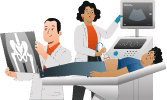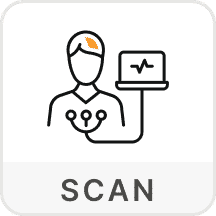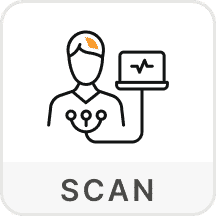near you Trusted by +
Patients Across India

Ecg (2)
Starting from₹391
Starting from₹2002
ECG
Book ECG Test at Top Diagnostic Centers - Advanced Heart Health Screening
If you are looking to book ECG test, numerous hospitals, diagnostic centres, and clinics offer this vital heart health screening. An Electrocardiogram (ECG) is a non-invasive test that records the heart’s electrical activity, helping detect abnormalities such as arrhythmias, heart attacks, and other cardiovascular conditions. It plays a crucial role in early diagnosis, enabling timely medical intervention. The ECG test cost can vary based on factors such as the type of ECG performed (resting ECG, stress ECG, or Holter monitoring), the healthcare provider, and location. However, many diagnostic centres offer affordable ECG test prices, ensuring accessibility for individuals prioritising heart health.
Finding an ECG test is easier than ever, with hospitals, diagnostic centres, and clinics offering ECG services. Many facilities provide affordable ECG test prices, ensuring accessibility for everyone in need of heart health screening. However, it is necessary to consult with your doctor to determine if an ECG is essential for your specific health needs and to find an ECG centre or clinic near you that offers the test at an affordable price. Leading diagnostic centres offer advanced ECG tests for early heart health screening. Book ECG test today at a trusted facility and take a proactive step towards a healthier heart. Book your ECG test online by typing ‘ ECG test near me’ for convenience and prioritise your well-being with a simple yet effective ECG test.
What is an ECG?
An Electrocardiogram (ECG) is a non-invasive diagnostic test that measures and records the electrical activity of the heart. It is a crucial tool in assessing heart health, helping to identify irregular heart rhythms, heart disease, and other cardiovascular conditions. By detecting abnormalities early, an ECG test plays a vital role in preventing serious heart complications ensuring timely medical intervention. Doctors often recommend an ECG test for individuals experiencing symptoms such as chest pain, shortness of breath, dizziness, or palpitations. It is also widely used in routine health check-ups, particularly for those with risk factors such as a history of heart disease, high blood pressure, or diabetes.
During an ECG, electrodes are placed on the chest, arms, and legs to detect the heart's electrical impulses. These impulses/signals are then recorded on graph paper or displayed on a monitor, allowing doctors to analyse the heart's health and help diagnose various heart conditions, such as arrhythmias, coronary artery disease, and heart attacks. This test can also help evaluate the effectiveness of treatments and medications for heart-related issues.
What are Some Common Uses of an ECG Test?
An Electrocardiogram (ECG) test is a valuable diagnostic tool used to assess heart health and detect potential cardiovascular issues. It helps in identifying abnormalities in the heart’s electrical activity, ensuring timely medical intervention. Here are some of the most common uses of an ECG test:
- Detecting Irregular Heart Rhythms (Arrhythmias): Identifies abnormal heartbeats that could indicate underlying conditions such as atrial fibrillation.
- Diagnosing Heart Disease: Helps detect signs of coronary artery disease, heart attacks, and other cardiac conditions.
- Evaluating Chest Pain: Determines whether chest pain is related to heart problems or other causes.
- Monitoring Heart Health: Used in routine health check-ups, especially for individuals with hypertension or diabetes.
- Assessing the Effectiveness of Treatment: Helps doctors monitor how well medications or medical devices like pacemakers are working.
- Preoperative Screening: Ensures the heart is functioning well before surgery.
- Monitoring Overall Heart Function: Recommended for athletes and individuals with a family history of heart disease.
How to Prepare for the ECG Test?
To ensure precise results and a hassle-free ECG test experience, it is essential to follow certain guidelines:
Do’s:
- Wear comfortable, loose-fitting clothing to allow easy access to your chest, arms, and legs.
- Inform your doctor about any medications you are taking, as some may influence the test results.
- Relax and stay still during the test to prevent any interference with the ECG readings.
Don’ts:
- Avoid applying lotions, oils, or powders on your chest, as they may hinder the electrode’s adhesion.
- Refrain from caffeine consumption or smoking for at least two hours before the test, as these can affect your heart rate.
- Do not engage in strenuous physical activity before the test unless specifically advised for a stress ECG.
- Following these precautions will help ensure an accurate and smooth heart health screening.
What Does the ECG Equipment Look Like?
An Electrocardiogram (ECG) machine is a compact yet sophisticated medical device designed to record the electrical activity of the heart. It typically consists of three main components: electrodes, lead wires, and a monitor or paper printout system.
The electrodes are small, adhesive patches that are placed on specific areas of the chest, arms, and legs. These electrodes are connected to the machine via lead wires, which transmit the heart’s electrical signals. Depending on the type of ECG being performed, the machine may have 3, 5, or 12 leads, each capturing different electrical viewpoints of the heart.
Once the electrodes detect electrical impulses, the machine processes the signals and displays them as a graphical waveform on a screen or prints them on paper. These waveforms represent the heart’s rhythm, rate, and overall function, helping doctors diagnose arrhythmias, heart disease, and other cardiac conditions. Modern ECG machines also feature digital storage and connectivity options, making it easier to share results with healthcare providers for further analysis.
How is the ECG Performed?
The ECG test is conducted by trained healthcare professionals and usually takes 5 to 10 minutes. Below is the step-by-step process of how an ECG is performed:
- Preparation: The patient is asked to lie down on an examination table. The technician may request the removal of any jewellery or accessories that could interfere with the test.
- Skin Preparation: To ensure proper electrode contact, the skin on the chest, arms, and legs is cleaned. If necessary, excess hair may be shaved.
Electrode Placement: Small adhesive electrodes are placed at specific points on the chest, arms, and legs. These electrodes are connected to the ECG machine through lead wires. - Recording the Heart’s Electrical Activity: The machine detects and records the heart’s electrical impulses, displaying them as waveforms on a monitor or printing them on paper.
- Patient Instructions: The patient is advised to remain still and breathe normally to avoid interference in the readings. Any movement or muscle tension can affect the accuracy of the test.
- Completion of the Test: Once the recording is complete, the electrodes are removed, and the patient can resume normal activities.
- Analysis of Results: A doctor or cardiologist reviews the ECG tracings to identify any abnormalities, such as irregular heart rhythms or signs of heart disease.
What Will I Experience During and After the Procedure?
Undergoing an ECG test is a simple, painless, and non-invasive process. However, patients may have certain experiences before, during, and after the procedure. Here’s what to expect:
1. Before the Procedure:
- You may be asked to change into a hospital gown and remove any jewellery or accessories that could interfere with the test.
- If necessary, a small area of skin on your chest, arms, or legs may be shaved to ensure the electrodes adhere properly.
- The technician will explain the procedure, allowing you to ask any questions or share any concerns.
2. During the Procedure:
- Small, sticky electrodes will be attached to your chest, arms, and legs. These are connected to the ECG machine via wires.
- You will be asked to lie still on an examination table and breathe normally.
- The test is completely painless, and you won’t feel any electrical impulses.
- The entire process typically takes about 5 to 10 minutes.
3. After the Procedure:
- Once the test is complete, the electrodes will be gently removed, which may cause mild discomfort similar to removing a plaster.
- There are no side effects, and you can resume your daily activities immediately.
- Your doctor will review the ECG results and discuss any findings if necessary.
FAQs
Is an ECG test painful?
No, an ECG test is completely painless. You might experience mild discomfort when the electrodes are applied or removed from your skin, but this is minimal and short-lived. The test itself is non-invasive and does not require any special preparation or recovery time.
How much is an ECG test price near me?
The ECG test cost varies depending on your location and the healthcare provider. Many diagnostic centres offer affordable pricing, and some may provide discounts or ECG test packages that include multiple tests at a reduced cost. Checking online by typing ‘ECG Test cost near me’ or with nearby clinics or hospitals can help you find the best option.
How often should I get an ECG test?
The frequency of ECG tests depends on your health condition, age, and family history of heart disease. If you have symptoms such as chest pain, dizziness, or irregular heartbeats, or if you are at high risk for heart conditions, your doctor may recommend regular ECG screenings. For most individuals, an ECG is performed as part of a routine check-up every few years.


